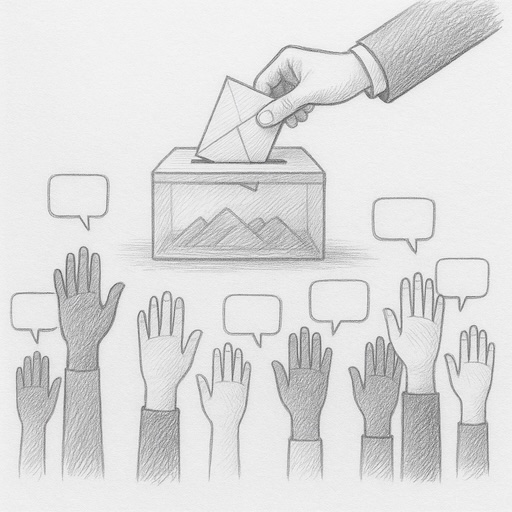In today’s world, democracy is often regarded as the gold standard of governance. It’s widely promoted as a symbol of freedom, fairness, and progress. So powerful is this idea that even authoritarian regimes—such as North Korea—refer to themselves as democratic states. In its case, the name is the Democratic People’s Republic of Korea. This reflects how deeply embedded the concept of democracy has become in global political legitimacy, even when the reality doesn’t align with the label.
Many people equate democracy with freedom, and while freedom is a central feature, democracy encompasses much more. It is not only about the liberty to speak or vote, but also about the structures that ensure accountability, fairness, and equal participation. True democracy involves institutions that protect rights, systems that balance power, and norms that encourage civic engagement.
This broader understanding of democracy lays the foundation for exploring its historical roots, social impact, and practical benefits. From the transformation of ancient power structures to modern systems that foster peace and prosperity, democracy has proven to be far more than just a mechanism for liberty—it is a complex framework that shapes societies at every level.
Ancient Roots vs. Modern Reality
Democracy began in ancient Athens around 508 BCE, but it looked very different from what we recognize today. Only free Athenian men could participate; most people—including women, slaves, and foreigners—were excluded.
Fast forward to the modern era, and democracy has dramatically expanded. It now seeks to include all citizens, regardless of gender or class. This transformation has only occurred in the past century or so. New Zealand became the first self-governing country to grant women the vote in 1893. Australia followed in 1902 (with some restrictions), the United States in 1920, and the UK in 1928. This expansion reflects a long-overdue inclusion of the majority in governance.
Economic Stability and Growth
Democracy creates fertile ground for economic development. In societies governed by monarchs or autocrats, there were few safeguards to protect private assets. A king or ruler could confiscate land, wealth, or property with little warning and no legal recourse. This made it difficult for ordinary people to accumulate wealth or plan for the future, and discouraged economic independence and investment.
In contrast, modern democracies offer stronger legal protections and more predictable institutions. Power is more distributed, the rule of law is more consistently applied, and individual property rights are upheld. People are less fearful of arbitrary expropriation or sudden policy shifts driven by the whims of a single leader. This sense of security encourages entrepreneurship, innovation, and long-term investment, ultimately contributing to more stable and equitable economic growth.
This institutional foundation is one of the reasons why the Industrial Revolution took root in England. The relative legal stability and protection of property rights under a more participatory system allowed entrepreneurs to take risks, invest in innovation, and accumulate capital without fear of arbitrary confiscation. Compared to more autocratic nations at the time, England provided a more fertile environment for sustained economic transformation.
Rising Living Standards Among the General Public
Prior to democratic reforms, society was typically divided into rigid hierarchies: kings, nobles, clergy, and peasants. The upper classes held power, wealth, and privilege, while the common people had little say in how their societies were governed. These systems were maintained through inheritance and tradition, often justified by religion or divine authority, leaving no space for social mobility or public accountability.
The introduction of democracy helped break down these entrenched power structures. It gradually replaced birthright and class status with the principles of equal citizenship and individual rights. Citizens began to gain legal recognition, political representation, and a voice in shaping their future. Universal education, access to the legal system, and equal voting rights emerged as key tools for inclusion. While inequality persists, democracy has opened pathways for the ordinary person to participate in public life and pursue opportunities that were once exclusively reserved for elites.
During the Industrial Revolution, countries began to require a more skilled and educated workforce to operate machinery, manage production processes, and support economic expansion. In response, the UK government and other governments and private institutions increased investment in education, technical training, and public literacy. This shift led not only to a more capable labor force but also to the emergence of a new social class—the middle class. Comprising skilled workers, technicians, teachers, clerks, and small business owners, the middle class became a stabilizing force in society and a key beneficiary of democratic and economic reforms.
Democracies Tend to Avoid War
One of the most fascinating features of democratic systems is their tendency to avoid wars with each other. When citizens have the right to vote—and could be the ones sent to fight—they are far less likely to support military conflict. Autocracies, by contrast, can engage in war more easily since decisions come from a small ruling elite who rarely face the direct consequences.
In the last 150 years, there have been no major wars between established democracies. While minor disputes—such as the Cod Wars between the UK and Iceland in the 1950s and 1970s, which were a series of confrontations over fishing rights—have occurred, they never escalated into full-scale military conflict. Although diplomatic tensions and naval standoffs did arise, the idea of a military invasion by the UK was politically unthinkable. The British public, who would have borne the human and financial costs of war, showed little appetite for escalation. This public restraint illustrates how democratic governments are often influenced—and limited—by the will of their citizens, reducing the likelihood of war. This phenomenon, widely discussed under the term democratic peace theory, highlights one of the internal stabilizing forces inherent in democratic systems.
The contrast is even more stark when considering non-democratic countries. Many of the most destructive conflicts in modern history have involved autocratic or authoritarian regimes. World War I and World War II were initiated or escalated by empires and fascist regimes such as Germany, Austria-Hungary, and Japan. More recently, wars in the Middle East—such as those involving Iraq under Saddam Hussein or Syria under Bashar al-Assad—have also stemmed from non-democratic governance. The authoritarian nature of these regimes made it easier for decisions of war to be made without public accountability or institutional restraint.
A Work in Progress
Democracy is far from perfect. It can be slow, inefficient, and vulnerable to misinformation or populism. But it represents a major shift in how humans organize themselves—not just politically, but socially and psychologically.
It challenges deep-rooted instincts toward hierarchy and dominance. Historically, power has often been concentrated in the hands of the few—usually those with wealth or force. Democracy redistributes power to the many, forcing leaders to earn legitimacy through consent rather than control.
That is precisely what makes democracy so important today. It invites us to grow beyond tribal instincts and toward collective responsibility, shared governance, and peaceful cooperation.

